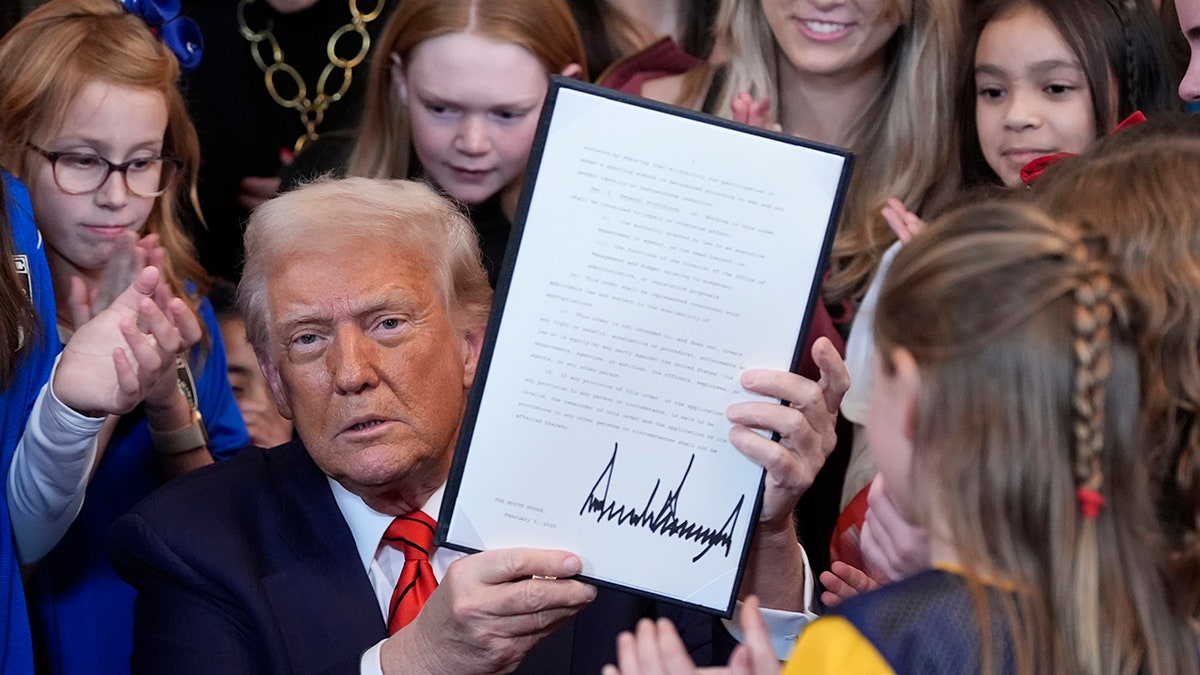Call To Action: Transgender Experiences Under Trump Executive Orders

Table of Contents
Military Ban and its Consequences
The Trump administration's ban on transgender individuals serving openly in the military dealt a devastating blow to transgender service members. The "military transgender ban," as it became known, resulted in the dismissal of numerous dedicated individuals who had served their country honorably. This discriminatory policy not only violated fundamental principles of equality and fairness but also had severe consequences for transgender service members and national security.
- Loss of employment and benefits: Transgender service members faced sudden unemployment, loss of healthcare benefits, and financial instability, leaving many vulnerable and without support.
- Increased mental health challenges: The ban fueled feelings of shame, isolation, and hopelessness, leading to increased rates of depression, anxiety, and suicidal ideation among transgender service members.
- Impact on military readiness and morale: The ban negatively impacted military readiness by excluding qualified individuals and creating a climate of fear and distrust within the ranks. The loss of skilled personnel and the erosion of morale undermined national security.
- Legal challenges and their outcomes: The ban faced numerous legal challenges, with varying outcomes in different courts. These legal battles highlighted the ongoing fight for transgender rights within the military and the broader legal landscape.
Bathroom Bills and Safe Spaces
Policies restricting bathroom access based on assigned sex at birth, often referred to as "bathroom bills," created unsafe and discriminatory environments for transgender individuals. These policies disregarded gender identity and fostered a climate of fear and vulnerability, denying transgender people access to basic necessities and safe public spaces.
- Increased vulnerability to harassment and violence: Transgender individuals faced increased risks of harassment, assault, and violence when forced to use bathrooms that did not align with their gender identity.
- Limitations on access to essential facilities: Restricting bathroom access limited transgender people's ability to participate fully in society, impacting their access to education, employment, and social activities.
- Psychological impact of discrimination and exclusion: The constant fear of harassment and discrimination had a significant negative impact on the mental health and well-being of transgender individuals.
- State-level variations in legislation and enforcement: The inconsistent implementation of these policies across states created a patchwork of legal protections and further complicated the challenges faced by transgender individuals.
Healthcare Access and Discrimination
Access to healthcare, particularly gender-affirming care, was severely impacted by policies enacted during the Trump administration. These actions created significant barriers to essential medical services for transgender individuals, impacting their overall health and well-being.
- Challenges in accessing gender-affirming hormone therapy and surgeries: Many transgender individuals faced difficulties accessing gender-affirming hormone therapy and surgeries due to insurance limitations, discriminatory practices by healthcare providers, and a lack of specialized care.
- Increased healthcare costs due to discriminatory practices: The lack of insurance coverage and discriminatory practices led to increased healthcare costs for transgender individuals, making it difficult for many to access the care they needed.
- Potential for denial of care based on gender identity: Transgender individuals faced the risk of being denied necessary medical care based solely on their gender identity, leading to significant health consequences.
- Impact on overall health and well-being of transgender individuals: The barriers to healthcare access created significant negative impacts on the physical and mental health of transgender individuals.
The Role of Advocacy Groups and Legal Challenges
LGBTQ+ advocacy groups played a crucial role in combating the discriminatory policies enacted during the Trump administration. These organizations mobilized resources, launched legal challenges, and conducted widespread public education campaigns.
- Efforts to overturn discriminatory policies through litigation: Numerous lawsuits were filed challenging the legality and constitutionality of discriminatory policies, leading to significant legal victories in some cases.
- Public awareness campaigns and education initiatives: Advocacy groups worked to raise public awareness about the impacts of discriminatory policies and to educate the public about transgender issues.
- Political advocacy and lobbying efforts: These organizations engaged in political advocacy and lobbying efforts to influence legislation and policy at both the state and federal levels.
- The impact of grassroots activism: Grassroots activism played a vital role in mobilizing support for transgender rights and in bringing about positive change.
Conclusion: A Call to Action for Transgender Rights
The Trump administration's executive orders inflicted profound harm on the transgender community, limiting access to healthcare, employment, and safe spaces. These actions underscored the ongoing need for vigorous advocacy and sustained efforts to protect transgender rights and ensure equal opportunities for all. We must continue to fight for transgender equality.
To create a more inclusive and equitable society, we must all take action:
- Support LGBTQ+ organizations: Donate to and volunteer with organizations working to advance transgender rights.
- Contact elected officials: Advocate for inclusive policies that protect the rights and well-being of transgender individuals.
- Educate yourself and others: Learn more about transgender issues and share your knowledge with others.
- Donate to organizations providing support: Contribute to organizations offering resources and support to transgender individuals.
By working together, we can build a future where all transgender individuals are treated with dignity, respect, and equality. Let's continue advocating for transgender individuals and ensuring that their voices are heard and their rights are protected. Protecting transgender rights is not just a moral imperative; it is a fundamental aspect of building a just and equitable society.

Featured Posts
-
 Evaluating Palantir Technologies Stock Is It Right For Your Portfolio
May 10, 2025
Evaluating Palantir Technologies Stock Is It Right For Your Portfolio
May 10, 2025 -
 Blockchain Analysis Giant Chainalysis Expands With Alterya Ai Acquisition
May 10, 2025
Blockchain Analysis Giant Chainalysis Expands With Alterya Ai Acquisition
May 10, 2025 -
 Bundesliga 2 Spieltag 27 Koeln Ueberholt Hamburg An Der Spitze
May 10, 2025
Bundesliga 2 Spieltag 27 Koeln Ueberholt Hamburg An Der Spitze
May 10, 2025 -
 Market Movers Sensex Nifty Jump Adani Ports Up Eternal Down
May 10, 2025
Market Movers Sensex Nifty Jump Adani Ports Up Eternal Down
May 10, 2025 -
 Exploring The He Morgan Brother 5 Theories To Identify David In High Potential
May 10, 2025
Exploring The He Morgan Brother 5 Theories To Identify David In High Potential
May 10, 2025
